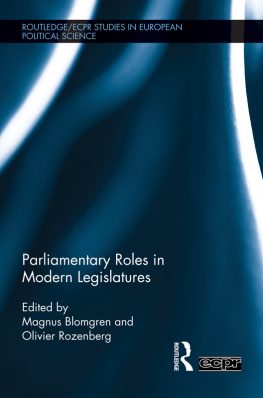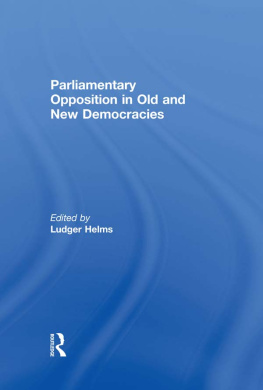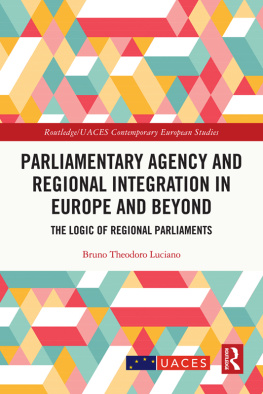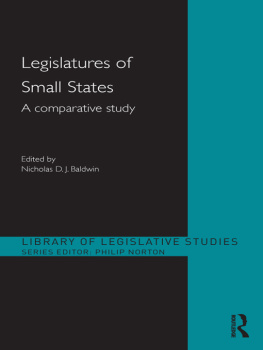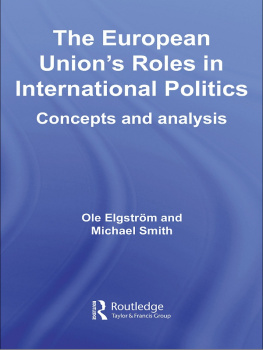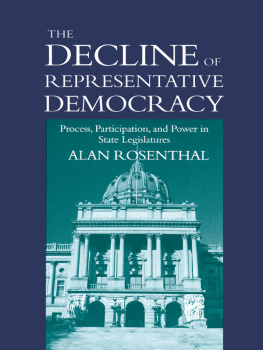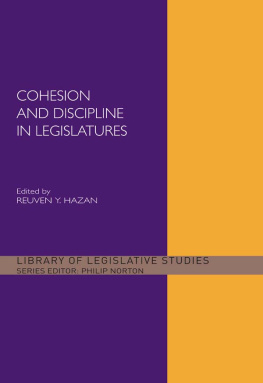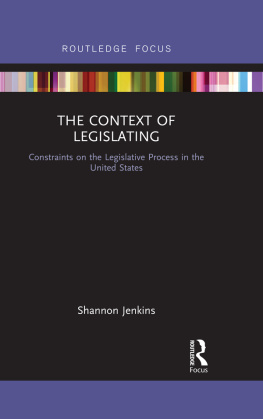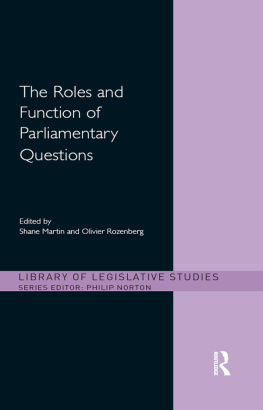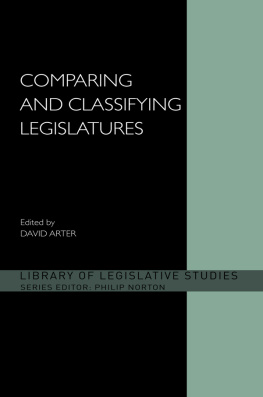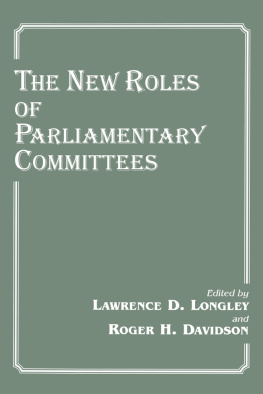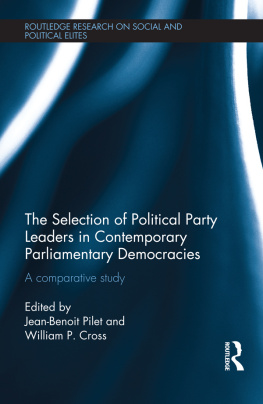The idea that legislators have, and understand themselves to have, many roles was central to early behavioral studies of legislatures, but fell out of favor with recognition that the initial models were overly simplistic. With this volume, Rozenberg, Blomgren and their colleagues return a sophisticated understanding of legislative roles to center stage. The book not only demonstrates the power of the concept of legislative roles in understanding legislative behavior, but also sets an important agenda for the future research.
Richard Katz, Johns Hopkins University, USA
Historically, the study of legislative roles has been one of the most productive fields in empirical research on parliaments and legislatures. After great advances during the 1950s and 1960s, the new institutionalism in its sociological variety has contributed to a renewed interest in the role orientations of parliamentarians. Magnus Blomgren and Olivier Rozenberg have assembled a number of very distinguished scholars from Europe and the US to explore the potential of legislative role analysis half a century after its first great advances. The resulting volume is an outstanding and original contribution to the field of legislative studies. Based on very rich empirical material across a large number of countries and the European Parliament, the authors demonstrate that the study of legislative roles is highly relevant to a modern analysis of legislative behavior and offers profound theoretical insights into the motivations and strategies of Members of Parliament.
Thomas Saalfeld, University of Bamberg, Germany
Parliamentary Roles in Modern Legislatures
This book gathers the most influential authors on role research and legislative studies to examine the different roles that MPs are playing in modern-day legislatures. It provides a comprehensive and critical overview of current research on legislative roles, summarises previous research, presents a large variety of methodological approaches and also explores the latest developing approaches to role theory.
The concept of political roles has become increasingly relevant for understanding contemporary political systems. Parliamentary, legislative and representative roles are professional roles that provide a way of connecting the individual legislator to their institution that can also explain a legislators attitude and behaviour. Drawing upon case studies with as much as 40 years of data that include Germany, the Netherlands, UK, Austria, Hungary, Australia, New Zealand and the European Parliament, this book examines the link between representative roles, different institutional settings and parliamentary behaviour. It argues that the roles MPs play depends on whom they think they should represent: between their voters, their party, the people of their country and also themselves, conflicts of loyalty can occur. This book provides a framework to analyse MPs choices by searching both the reasons for their views about representation, and the consequences of those views in parliament.
Parliamentary Roles in Modern Legislatures will be of strong interest to students and scholars of government, legislative studies, political parties, comparative politics, political sociology and deliberative democracy.
Magnus Blomgren is a Senior Lecturer at the Department of Political Science at Ume University, Sweden.
Olivier Rozenberg is Associate Research Professor at Sciences Po (Paris) where he works in the Centre dtudes europennes.
Routledge/ECPR studies in European political science
Edited by Thomas Poguntke
Ruhr University Bochum, Germany on behalf of the European Consortium for Political Research

The Routledge/ECPR Studies in European Political Science series is published in association with the European Consortium for Political Research the leading organization concerned with the growth and development of political science in Europe. The series presents high-quality edited volumes on topics at the leading edge of current interest in political science and related fields, with contributions from European scholars and others who have presented work at ECPR workshops or research groups.
1 Regionalist Parties in Western Europe
Edited by Lieven de Winter and Huri Trsan
2 Comparing Party System Change
Edited by Jan-Erik Lane and Paul Pennings
3 Political Theory and European Union
Edited by Albert Weale and Michael Nentwich
4 Politics of Sexuality
Edited by Terrell Carver and Vronique Mottier
5 Autonomous Policy Making by International Organizations
Edited by Bob Reinalda and Bertjan Verbeek
6 Social Capital and European Democracy
Edited by Jan van Deth, Marco Maraffi, Ken Newton and Paul Whiteley
7 Party Elites in Divided Societies
Edited by Kurt Richard Luther and Kris Deschouwer
8 Citizenship and Welfare State Reform in Europe
Edited by Jet Bussemaker
9 Democratic Governance and New Technology
Technologically mediated innovations in political practice in Western Europe
Edited by Ivan Horrocks, Jens Hoff and Pieter Tops
10 Democracy without Borders
Transnationalisation and conditionality in new democracies
Edited by Jean Grugel
11 Cultural Theory as Political Science
Edited by Michael Thompson, Gunnar Grendstad and Per Selle
12 The Transformation of Governance in the European Union
Edited by Beate Kohler-Koch and Rainer Eising
13 Parliamentary Party Groups in European Democracies
Political parties behind closed doors
Edited by Knut Heidar and Ruud Koole
14 Survival of the European Welfare State
Edited by Stein Kuhnle
15 Private Organisations in Global Politics
Edited by Karsten Ronit and Volker Schneider
16 Federalism and Political Performance
Edited by Ute Wachendorfer-Schmidt
17 Democratic Innovation
Deliberation, representation and association
Edited by Michael Saward
18 Public Opinion and the International Use of Force
Edited by Philip Everts and Pierangelo Isernia
19 Religion and Mass Electoral Behaviour in Europe
Edited by David Broughton and Hans-Martien ten Napel
20 Estimating the Policy Position of Political Actors
Edited by Michael Laver
21 Democracy and Political Change in the Third World
Edited by Jeff Haynes
22 Politicians, Bureaucrats and Administrative Reform
Edited by B. Guy Peters and Jon Pierre
23 Social Capital and Participation in Everyday Life
Edited by Paul Dekker and Eric M. Uslaner
24 Development and Democracy
What do we know and how?
Edited by Ole Elgstrm and Goran Hyden
25 Do Political Campaigns Matter?
Campaign effects in elections and referendums
Edited by David M. Farrell and Rdiger Schmitt-Beck
26 Political Journalism
New challenges, new practices
Edited by Raymond Kuhn and Erik Neveu
27 Economic Voting
Edited by Han Dorussen and Michaell Taylor
28 Organized Crime and the Challenge to Democracy
Edited by Felia Allum and Renate Siebert
29 Understanding the European Unions External Relations
Edited by Michle Knodt and Sebastiaan Princen
30 Social Democratic Party Policies in Contemporary Europe
Next page
